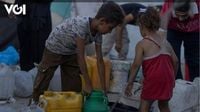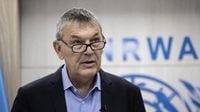Barcelona Mayor Jaume Collboni stood before a sea of stacked aid boxes in a UNRWA warehouse on Monday, his voice echoing the frustration and urgency felt across much of the international community. Just days before, Collboni had been barred from entering Israel, a move he called “trivial” compared to what he described as the “cruelly serious” situation unfolding in Gaza. According to El País, Collboni’s attempted visit was intended to highlight and support humanitarian efforts for Palestinians caught in the ongoing siege, but Israel’s ban only underscored the growing tensions between the two sides.
“We didn’t think we’d be so important,” Collboni remarked wryly, referencing Israel’s reaction to Barcelona’s recent decision to cut official ties with Israel and Tel Aviv. The mayor insisted that such actions “have consequences,” and that Barcelona’s stance was a testament to the city’s commitment to global justice. Yet, as he pointed out, the real crisis was not about diplomatic snubs but about the more than 6,000 aid trucks unable to deliver food and medicine into the Gaza Strip as of August 25, 2025.
The humanitarian catastrophe Collboni described is not just a matter of numbers. On Friday, August 22, the United Nations’ Integrated Food Security Phase Classification (IPC) made a historic declaration: famine had officially taken hold in northern Gaza, with projections it would spread further south by the end of September. According to the Associated Press, this marks the first time the UN has declared famine outside sub-Saharan Africa, underscoring the severity of the crisis.
Philippe Lazzarini, the head of the UN agency for Palestinian refugees (UNRWA), did not mince words. “Famine is the last calamity hitting the people of Gaza. Hell in all shapes,” he posted on X, the social media platform formerly known as Twitter. Lazzarini went on to call Israel’s denial of the famine “the most obscene expression of dehumanization.” He urged the Israeli government to “stop promoting a different narrative, to let humanitarian organisations provide assistance without restrictions and allow international journalists to report independently from Gaza.”
But Israel’s leadership has firmly rejected the UN’s assessment. Prime Minister Benjamin Netanyahu labeled the IPC report “an outright lie” and “a modern blood libel,” according to Haaretz. The Israeli government’s stance has been to deny the existence of famine, despite mounting evidence and international concern.
Meanwhile, the situation on the ground continues to deteriorate. Since March 2, 2025, Israel has closed all crossings into Gaza, effectively blocking the vast majority of humanitarian aid. Trucks loaded with food, water, and medical supplies have been left idling at the border, unable to reach the 2.4 million residents of the besieged enclave. Only a trickle of aid has been allowed through, far short of what is needed to stave off starvation and disease.
The blockade’s impact has been compounded by direct attacks on aid convoys themselves. On Sunday night, August 24, a convoy of 59 Jordanian aid trucks heading to Gaza was attacked by Israeli settlers, as reported by Antara News. Four of the trucks had their windows, front panels, and sides damaged by stones hurled by settlers who, according to Jordanian authorities, were fully aware that the vehicles were carrying humanitarian supplies. The settlers also slashed the trucks’ tires, further hampering the already fraught aid operation.
Jordan’s government was quick to condemn the attack, emphasizing that such actions endangered the lives of drivers, impeded the delivery of critical aid, and constituted clear violations of international law. Mohammed Momani, a spokesperson for the Jordanian government, placed the blame squarely on Israel for failing to prevent repeated threats and attacks on aid vehicles. “The Israeli government’s response to previous incidents was weak, leading to a repeat of this incident,” Momani stated, calling for greater accountability and immediate action to ensure the safety of humanitarian missions.
For Collboni, the violence and obstruction faced by aid workers only reinforces the urgency of Barcelona’s support for Gaza. He expressed deep gratitude for the messages of solidarity he has received from the mayors of Bethlehem, Ramallah, and especially Gaza City. On Sunday, August 24, Yahya R. Sarraj, the mayor of Gaza City, sent Collboni a letter of thanks from within the besieged enclave, surrounded by Israeli troops. The gesture was a poignant reminder of the human connections and shared struggles that transcend borders, even in the darkest of times.
The context behind these events is as complex as it is tragic. Since October 7, 2023, Israeli military operations in Gaza have killed more than 62,600 Palestinians, according to Al Jazeera. The devastation has left much of the territory in ruins, with basic infrastructure destroyed and entire communities displaced. International legal bodies have taken notice: in November 2024, the International Criminal Court issued arrest warrants for Prime Minister Netanyahu and former Defense Minister Yoav Gallant, charging them with war crimes and crimes against humanity in Gaza. Israel is also facing a genocide case at the International Court of Justice—a rare and weighty accusation that reflects the gravity of the ongoing conflict.
Despite the mounting evidence and international condemnation, the Israeli government has remained steadfast in its narrative, denying both the existence of famine and the scale of civilian suffering. Critics argue that this denial is not just a matter of semantics but has real, life-or-death consequences for those trapped inside Gaza. As Lazzarini put it, “Every hour counts,” a stark reminder that delays and obstructions in aid delivery can mean the difference between life and death for thousands.
The international community is faced with a dilemma: how to respond to a crisis that is both acute and deeply politicized. Some governments and organizations have called for an immediate ceasefire and for Israel to lift the blockade, while others have focused on diplomatic pressure and legal avenues. Within Israel itself, opinions are sharply divided, with some defending the government’s security rationale and others expressing horror at the humanitarian toll. Meanwhile, Palestinians and their supporters continue to demand urgent action and accountability, insisting that the world cannot look away from what is unfolding in Gaza.
As the trucks remain stranded and the famine deepens, the people of Gaza are caught in a deadly limbo. The declarations from international bodies, the condemnations from foreign governments, and the solidarity expressed by leaders like Collboni all point to the same stark reality: the crisis in Gaza is not just a political dispute but a human catastrophe of historic proportions. The question now is whether the world will find the will—and the means—to bring relief before it is too late.


